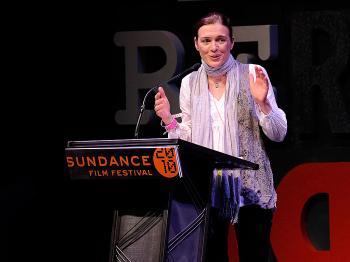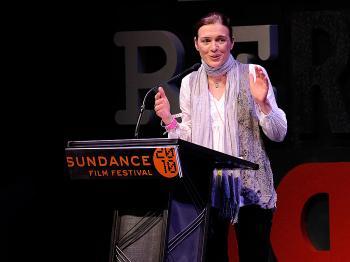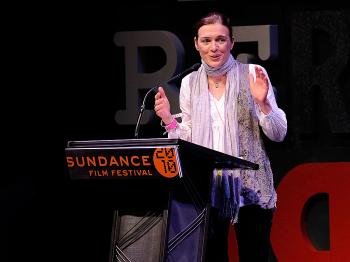LOS ANGELES—I met with filmmaker Diane Bell upon her triumphant return from the Sundance Film Festival, where her first feature, Obselidia, picked up two awards, best cinematography for a drama and the Alfred P. Sloan Prize awarded to a film with a focus or major character related to the field of science and technology.
The Scottish-born Bell explains that her films are less about answers but an exploration.
Obselidia was a perfect vehicle,” she says, to explore themes of major significance to her—memory, impermanence, loss, and death.
The main character of the film is George, the self-proclaimed last door-to-door encyclopedia salesman, who is himself writing an encyclopedia of obsolete things. He believes that it’s important to hold on to the past. In his research, he meets Sophie, a sensuous silent movie projectionist, who describes impermanence to be freeing.
The two venture on a pilgrimage to Death Valley to meet a former NASA scientist, who predicts the human race will be destroyed due to climate changes, within a matter of decades.
The beautifully composed and provocative film asks, “If it does all disappear tomorrow, how will we live today?” Is it more beneficial to remember or to forget? Does scientific advancement, in fact, “make our lives better or easier,” and is love obsolete, or do we need love now more than ever?
Bell’s obsession with these ideas came from a longstanding query, which led her to study philosophy in college—“How do we live a good life?”
This equation, Bell asserts, must therefore include the unavoidable issue of death. This is in fact the subject of Bell’s next screenplay and part of a comparison she makes that creating art requires taking risks.
As a constant reminder of this principle, she keeps a copy of her favorite poem on her desk, entitled “Constantly Risking Absurdity” by Lawrence Ferlinghetti. Reinforcing this message in her workspace is a photo of the famous tight rope walker Philippe Petit, from the documentary Man on Wire, who famously danced high in the sky between the former Twin Towers of New York.
The Scottish-born Bell explains that her films are less about answers but an exploration.
Obselidia was a perfect vehicle,” she says, to explore themes of major significance to her—memory, impermanence, loss, and death.
The main character of the film is George, the self-proclaimed last door-to-door encyclopedia salesman, who is himself writing an encyclopedia of obsolete things. He believes that it’s important to hold on to the past. In his research, he meets Sophie, a sensuous silent movie projectionist, who describes impermanence to be freeing.
The two venture on a pilgrimage to Death Valley to meet a former NASA scientist, who predicts the human race will be destroyed due to climate changes, within a matter of decades.
The beautifully composed and provocative film asks, “If it does all disappear tomorrow, how will we live today?” Is it more beneficial to remember or to forget? Does scientific advancement, in fact, “make our lives better or easier,” and is love obsolete, or do we need love now more than ever?
Bell’s obsession with these ideas came from a longstanding query, which led her to study philosophy in college—“How do we live a good life?”
This equation, Bell asserts, must therefore include the unavoidable issue of death. This is in fact the subject of Bell’s next screenplay and part of a comparison she makes that creating art requires taking risks.
As a constant reminder of this principle, she keeps a copy of her favorite poem on her desk, entitled “Constantly Risking Absurdity” by Lawrence Ferlinghetti. Reinforcing this message in her workspace is a photo of the famous tight rope walker Philippe Petit, from the documentary Man on Wire, who famously danced high in the sky between the former Twin Towers of New York.






